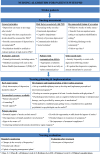What should nurses do on post-stroke depression? A global systematic assessment of clinical practice guidelines
- PMID: 36351723
- PMCID: PMC9644339
- DOI: 10.1136/bmjopen-2022-064069
What should nurses do on post-stroke depression? A global systematic assessment of clinical practice guidelines
Abstract
Objectives: Post-stroke depression (PSD) is the most common mental disorder in post-stroke patients. Yet, the recommendations related to nursing in clinical practice guidelines (CPGs) have not been systematically sorted out. This study aimed to assess the methodological quality of current CPGs related to PSD and develop an algorithm using nursing process as a framework for nurses.
Design: A systematic assessment of CPGs.
Interventions: A systematic search for relevant CPGs published between 2017 and 2022 was conducted. Appraisal of Guidelines for Research and Evaluation Ⅱ instrument was used to assess methodological quality. Recommendations related to nursing practice from high-quality CPGs were summarised and developed into an algorithm to provide reference for the standardised construction of nursing practice scheme.
Results: 497 records were initially identified from database searches and other sources. Finally, 12 CPGs were included, of which 6 were rated as high quality. A total of 35 recommendations from the 6 highest-scoring CPGs were summarised and used to develop an algorithm.
Conclusions: This study indicated deficiencies and variability in current available CPGs. Based on six high-quality CPGs, we developed an algorithm to facilitate nurses' adherence to CPGs and contribute to evidence-based nursing. In the future, more nursing specialists should participate in the formulation of the CPGs to provide nursing insights.
Keywords: adult psychiatry; depression & mood disorders; stroke.
© Author(s) (or their employer(s)) 2022. Re-use permitted under CC BY-NC. No commercial re-use. See rights and permissions. Published by BMJ.
Conflict of interest statement
Competing interests: None declared.
Figures
Similar articles
-
Critical quality appraisal and algorithm development of clinical practice guidelines for management of poststroke sensory loss: a systematic review.BMJ Open. 2023 Nov 17;13(11):e074082. doi: 10.1136/bmjopen-2023-074082. BMJ Open. 2023. PMID: 37977862 Free PMC article.
-
Management of bone health in women with premature ovarian insufficiency: Systematic appraisal of clinical practice guidelines and algorithm development.Maturitas. 2019 Oct;128:70-80. doi: 10.1016/j.maturitas.2019.07.021. Epub 2019 Jul 31. Maturitas. 2019. PMID: 31561827
-
Recommendations of high-quality clinical practice guidelines related to the process of starting dialysis: A systematic review.PLoS One. 2022 Jun 13;17(6):e0266202. doi: 10.1371/journal.pone.0266202. eCollection 2022. PLoS One. 2022. PMID: 35696388 Free PMC article.
-
Development of clinical practice guidelines for urinary continence care of adult stroke survivors in acute and rehabilitation settings.Can J Neurosci Nurs. 2014;36(3):16-31. Can J Neurosci Nurs. 2014. PMID: 25638914
-
Management of cardiovascular disease in women with premature ovarian insufficiency: critical quality appraisal of clinical guidelines and algorithm development.Menopause. 2022 Jan 10;29(2):189-199. doi: 10.1097/GME.0000000000001899. Menopause. 2022. PMID: 35013058
References
Publication types
MeSH terms
LinkOut - more resources
Full Text Sources
Medical


